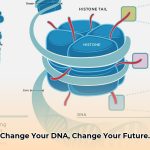Have you ever stopped to consider the vast, unseen world teeming within you? It’s a complex and dynamic ecosystem, a universe of trillions of bacteria, fungi, viruses, and other microorganisms collectively known as the human microbiome. This isn’t just a random collection of microbes; it’s an integral part of your body, influencing everything from your digestion and immune system to your mood and even your susceptibility to certain diseases. Learn more about how lifestyle impacts your genes: lifestyle’s impact on genes.
This article delves into the fascinating world of the human microbiome, exploring its composition, function, and the factors that shape it. We’ll uncover the latest scientific discoveries, debunk common myths, and provide actionable strategies to cultivate a thriving inner ecosystem for personalized health and well-being.
What is the Human Microbiome?
The human microbiome is the collection of all microorganisms — bacteria, fungi, viruses, and archaea — that live in and on the human body. These microbes are not just passive inhabitants; they actively participate in numerous physiological processes that are essential for human health.
Key facts about the microbiome:
- Trillions of microbes: The number of microbial cells in your body outnumbers your human cells by a ratio of approximately 1.3 to 1.
- Diverse locations: While the gut microbiome is the most well-known, microbes colonize virtually every surface of the body, including the skin, mouth, nose, lungs, and reproductive tract.
- Unique composition: Each individual has a unique microbial fingerprint, influenced by genetics, diet, environment, and lifestyle.
Where Does Your Microbiome Come From?
The establishment of your microbiome begins at birth. Babies born vaginally are exposed to their mother’s vaginal and gut microbes, which are crucial for initial immune system development and gut colonization. Infants born via Cesarean section acquire microbes primarily from the hospital environment and maternal skin, leading to a different initial microbial composition.
Breastfeeding provides another vital source of microbes and beneficial compounds called oligosaccharides, which nourish specific gut bacteria, such as Bifidobacteria, in infants. As you grow and interact with the environment, your microbiome continues to evolve and diversify.
The Vital Roles of Your Microbiome
The human microbiome plays a vital role in many aspects of human health, including:
- Digestion and Nutrient Absorption: Gut microbes break down complex carbohydrates, synthesize essential vitamins (such as B12 and K), and help the body absorb nutrients. They also metabolize fiber into short-chain fatty acids (SCFAs), which nourish the gut lining and reduce inflammation.
- Immune System Development and Regulation: The microbiome plays a crucial role in training and educating the immune system, helping it distinguish between harmless and harmful microbes. It also produces antimicrobial compounds that protect against pathogens and competes with invaders for resources.
- Mental Health and Brain Function: The gut microbiome communicates with the brain through the gut-brain axis, a complex network of neural, hormonal, and immune signals. Gut microbes can influence mood, appetite, and cognitive function. Research has linked alterations in the gut microbiome to anxiety, depression, autism, and neurodegenerative diseases.
- Protection Against Pathogens: The beneficial microbes in your microbiome compete with harmful pathogens for resources and attachment sites, preventing them from colonizing your body and causing infection. They also produce antimicrobial substances that directly kill or inhibit the growth of pathogens.
- Metabolism and Weight Management: Certain gut microbes can influence how your body stores fat and metabolizes energy. Imbalances in the gut microbiome have been linked to obesity and metabolic disorders.
Factors That Influence Your Microbiome
Many factors can impact the composition and diversity of your microbiome, including:
- Diet: Diet is one of the most significant factors influencing the microbiome. A diet rich in fiber, fruits, vegetables, and fermented foods promotes a diverse and balanced microbiome. Conversely, a diet high in sugar, fat, and processed foods can reduce microbial diversity and promote the growth of harmful bacteria.
- Antibiotics: Antibiotics can disrupt the balance of the microbiome by killing both beneficial and harmful bacteria. This disruption can lead to dysbiosis, an imbalance in the microbial community that can increase the risk of infections and other health problems.
- Environment: Exposure to different environments, such as nature, pets, and other people, can influence the diversity of your microbiome.
- Lifestyle: Factors such as stress, sleep, and exercise can also impact the microbiome.
- Genetics: Your genes can influence the types of microbes that thrive in your body.
Understanding Dysbiosis and Its Consequences
Dysbiosis is an imbalance in the composition and function of the microbiome. It can occur when the number of beneficial bacteria decreases, the number of harmful bacteria increases, or the overall diversity of the microbiome is reduced.
Dysbiosis has been linked to a wide range of health problems, including:
- Inflammatory bowel disease (IBD)
- Obesity
- Type 2 diabetes
- Allergies
- Asthma
- Autoimmune diseases
- Mental health disorders
Strategies for Cultivating a Healthy Microbiome: A Roadmap to Wellness
Fortunately, there are many steps you can take to promote a healthy and balanced microbiome. Below are evidence-based strategies to optimize your microbial ecosystem:
- Embrace a Diverse, Plant-Rich Diet: Fuel your microbial allies with a variety of fiber-rich foods like fruits, vegetables, whole grains, and legumes. Fiber feeds beneficial bacteria, promoting their growth and activity.
- Incorporate Fermented Foods: Foods like yogurt, kefir, sauerkraut, kimchi, and kombucha contain live probiotics that can add beneficial bacteria to your gut. Look for options with live and active cultures and minimal added sugar.
- Consider Prebiotic Supplements: Prebiotics are non-digestible fibers that act as food for your existing gut bacteria. Good sources include garlic, onions, asparagus, bananas, and oats. You can also take prebiotic supplements like inulin or fructooligosaccharides (FOS).
- Use Antibiotics Judiciously: Antibiotics can be life-saving, but they also disrupt the microbiome. Only use them when necessary and as prescribed by a doctor. After antibiotic use, focus on restoring your microbiome with probiotics and a healthy diet.
- Spend Time in Nature: Exposure to diverse microbial environments in nature can enrich your microbiome. Aim to spend time outdoors regularly, especially in green spaces.
- Manage Stress Levels: Chronic stress can negatively impact your gut microbiome. Practice stress-reducing activities like meditation, yoga, or spending time in nature.
- Prioritize Quality Sleep: Lack of sleep can disrupt the gut microbiome. Aim for 7-9 hours of quality sleep per night.
- Consider Probiotic Supplements: Probiotic supplements contain live bacteria that can benefit your gut health. Choose a high-quality probiotic with a variety of strains and consult with a healthcare professional to determine the best option for you. Note: It’s essential to store them properly, as directed on the label.
- Limit Processed Foods, Sugar, and Artificial Sweeteners: These ingredients can negatively impact your microbiome.
- Stay Active: Regular exercise can positively influence the composition and diversity of your gut microbiome.
Fecal Microbiota Transplantation: A Cutting-Edge Treatment
Fecal microbiota transplantation (FMT) involves transferring stool from a healthy donor to a recipient with a disrupted microbiome. FMT has shown remarkable success in treating recurrent Clostridium difficile infections and is being investigated for other conditions, such as IBD and metabolic disorders.
The Future of Microbiome Research and Personalized Medicine
The field of microbiome research is rapidly advancing, with new discoveries constantly emerging. Scientists are working to develop personalized microbiome therapies tailored to an individual’s unique microbial profile. These therapies may include:
- Designer probiotics: Engineered microbes that can produce specific molecules, deliver drugs, or modulate the immune system.
- Precision prebiotics: Targeted dietary fibers that selectively promote the growth of beneficial bacteria.
- Fecal microbiota transplantation (FMT): Using stool from carefully screened donors to restore a healthy microbiome.
The Promise of Psychobiotics: Tapping into the Gut-Brain Axis
Psychobiotics are live bacteria that, when ingested, can benefit mental health. Research suggests that certain probiotic strains can reduce anxiety, improve mood, and enhance cognitive function. Psychobiotics represent a promising new avenue for treating mental health disorders through manipulation of the gut microbiome.
Embracing the Microbial World Within: A Journey Towards Holistic Health
The human microbiome is a complex and dynamic ecosystem that plays a vital role in our health and well-being. By understanding the factors that influence the microbiome and adopting strategies to cultivate a healthy inner ecosystem, we can unlock the potential for personalized health and disease prevention.
Embrace the microbial world within you – it’s a universe of possibilities waiting to be explored!
















